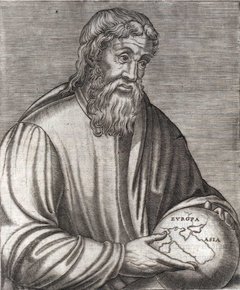Strabo
|
|
"Strabo" ("squinty") was a term employed by the Romans for anyone whose eyes were distorted or deformed. The father of Pompey was called "Pompeius Strabo." A native of Sicily so clear sighted that he could see things at great distance as if they were nearby was also called "Strabo." See also Walahfrid Strabo and Theodoric Strabo.
The most significant figure by this name, however, was Strabo (born 63 BC or 64 BC, died ca. 24 AD), a Greek historian, geographer and philosopher. Nowadays, Strabo is mostly famous for his Geographia, a 17-book work containing history and descriptions of people and places all over the world as known to him.
Strabo was born in a wealthy family from Amaseia (current-day Amasya, Turkey) in Pontus, which became part of the Roman empire just around the time of his birth. He studied under various geographers and philosophers, first in his own area, later in Rome. He was philosophically a stoicist, politically a proponent of Roman imperialism. Later he made extensive travels to among others Egypt and Ethiopia. It is not known when he wrote his Geographia though remarks in it place the finished version in the reign of Emperor Tiberius; some place its first drafts around 7 AD, others around 18 AD. The death of Juba, king of Maurousia is mentioned, an event which took place in 23 AD.
Strabo's Historia is lost: Strabo quotes it himself, and other classical authors mention that it existed. All that we have of it is a fragment of papyrus now at the University of Milan (renumbered P[apyrus] 46).
Several different dates have been proposed for Strabo's death, most of them placing it shortly after 23 AD.
| Contents |
The Geography
The Geographia is an extensive work in Greek, spanning 17 volumes, and can be regarded as an encyclopedia of the geographical knowledge of his time; except for parts of Book 7, it has come down to us complete. Yet while it does cover the entire world known to the Greeks and Romans of his time, it suffers from several major flaws: a constant and very intrusive defense of the poet Homer as a geographical source, leading him to dismiss more recent writers, such as Herodotus, who were often eyewitnesses to what they reported; a preoccupation with minute, often captiously argumentative, criticism of these other writers; a peculiarly Greek aprioristic attitude to facts, seeking to derive them from the pure exercise of reason: in sum, one would prefer more geography and less argumentation. These byways, however, do provide modern scholars with valuable historical information on the methods of ancient geography and on many older geographers whose works have not come down to us.
Some thirty manuscripts of Geographia or parts of it have survived, almost all of them medieval copies of copies, though there are fragments from papyrus rolls which were probably copied out ca AD 100‑300. Scholars have struggled for a century and a half to produce an accurate edition close to what Strabo wrote. A definitive one has been in publication since 2002, appearing at a rate of about a volume a year.
External links
The text of Strabo online
- Books 1‑7, 15‑17 (http://penelope.uchicago.edu/Thayer/E/Roman/Texts/Strabo/home.html) in English translation, ed. H. L. Jones (1924), at LacusCurtius
- Books 6‑14 (http://www.perseus.tufts.edu/cgi-bin/ptext?lookup=Strab.+toc) in English translation, ed. H. L. Jones (1924), Perseus Digital Library
Secondary material
- Sarah Pothecary, "Editions of Strabo's Geographia" (http://members.aol.com/spothecary/editions.html); see also this author's "Getting started with Strabo" (http://members.aol.com/spothecary/gettingstarted.html)uk:Страбон
de:Strabon fr:Strabon nl:strabo pt:Estrabão sl:Strabon sr:СÑÑабон es:Estrabón de Amasia

